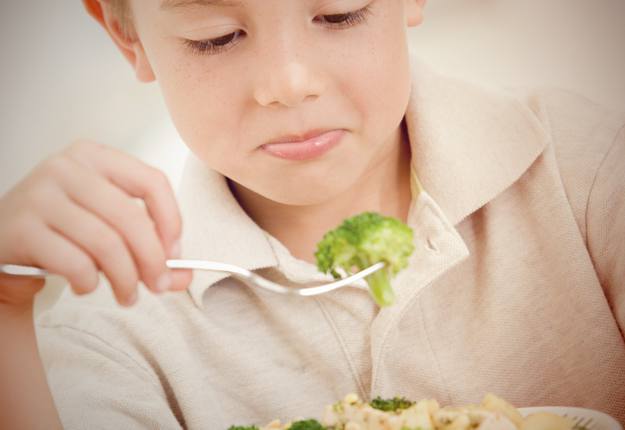A fussy toddler is the age old nemesis of a parent.
As a survivor and a nutritionist, my tip is to prepare for this battle well ahead of time:
- Aim for a pregnancy and breast feeding diet that is highly varied and comprises a wide variety of foods and flavours (although don’t expect miracles – fear of new foods is a natural, protective response)
- Expose your baby to food aromas – get your cook on and fill the house with the wonderful smell of herbs, spices, baking and broth
- Allow your baby to see parents and siblings enjoy a variety of different foods and food situations
- Create a positive family food environment – relaxed, social, calm, regular routine, aesthetically pleasing environment, without distractions from TV or other media devices
- Encourage your baby to be involved with the family food environment – seat them at, or near the table, let them watch food preparation, encourage play with utensils (plastic cups, spoons and bowls)
Once solids are introduced, continue with these strategies but also:
- Repeat exposure to new foods (10 – 20 times may be necessary to develop acceptance of new foods)
- Don’t use food as a reward (this can have a variety of undesirable repercussions)
- Don’t bribe or punish a child for not consuming food of finishing their plate
- Offer foods of a variety of different texture and encourage them to become familiar with them the best way kids know how – with their hands! Squishing, squashing and rubbing food all helps children become familiar with, and accept, different textures. Draw the line at throwing or other unproductive behaviour and as they get older you can guide their table manners.
- Allow a child to regulate their own appetite (don’t force feed, but try to keep eating to meal/ snack times, served food in regular settings, away from the TV; snack size meals every 2-3hrs is appropriate for small children)
- Offer a child the foods you desire them to consume when they are most hungry (allow them to eat their vegetables before the rest of their meal to develop associations with satiety, not as a reward/bribe system)
- Praise a child for tasting and/or trying a new food, even if they don’t eat it
- Comment on the enjoyment of food you are consuming – “this carrot is really tasty,” I like how crunchy it is,”
- Keep items out of sight that you don’t want to promote consumption of (put the biscuit tin in the cupboard), but make available items which you want your child to consume (put the fruit bowl on the bench)
- Role model the behaviours you want them to adopt – you can’t expect your child to snack on fruit if you are snacking on chips!
Do you have any tips to add to this list? SHARE with us in the comments below.





















11:23 am
10:17 pm
6:33 pm
11:53 am
6:57 am
-

-
-
mom94125 replied
- 19 Oct 2015 , 6:02 pm
Reply5:43 am
11:07 pm
7:39 am
11:07 am
11:22 pm
1:05 pm
2:05 pm
6:27 am
8:44 pm
9:01 pm
2:03 pm
12:38 pm
3:39 pm
10:59 pm
12:24 pm
- 1
- 2
- 3
- »
Post a commentTo post a review/comment please join us or login so we can allocate your points.